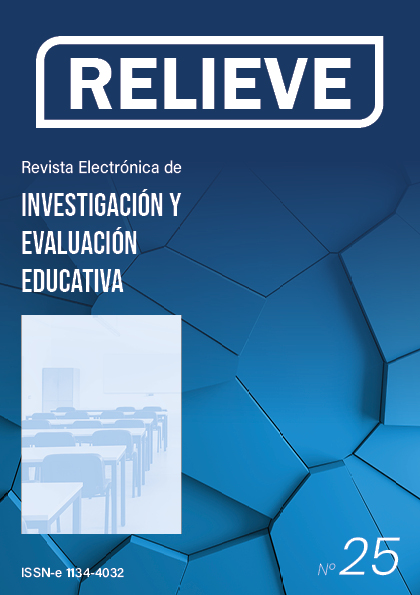Equal opportunities and educational inclusion in Spain
DOI:
https://doi.org/10.7203/relieve.25.2.14351Keywords:
Equality of opportunity, Educational inclusion, PISA 2015, Academic resilience, Social and emotional resilience, Personalization of teachingAbstract
There is a growing international consensus that considers equity as a necessary, though not sufficient, characteristic of the quality of education systems. PISA 2015 has established two fundamental pillars of equity: equal opportunities and educational inclusion. Regarding equal opportunities, the OECD has chosen to distinguish the influences on students from the circumstances, on the one hand, and the effort, on the other. Of the first the student would not be responsible; of the second if it would be, by virtue of their individual choices. Regarding educational inclusion, it has established a distinction between academic inclusion and social inclusion. The present work is based on that same conceptual framework, but it enriches the indicators of equality of opportunities through indexes of processes that would improve the results of the students operating on their circumstances from the school environment. From the samples of Spain and its seventeen autonomous communities in PISA 2015, this work makes the measurement of a broad set of indicators and analyzes the relationships between them. From this broad set of empirical results, it draws relevant consequences for the improvement of the education system in Spain and its autonomous communities in terms of equity
Downloads
Downloads
Published
How to Cite
Issue
Section
License
The authors grant non-exclusive rights of exploitation of works published to RELIEVE and consent to be distributed under the Creative Commons Attribution-Noncommercial Use 4.0 International License (CC-BY-NC 4.0), which allows third parties to use the published material whenever the authorship of the work and the source of publication is mentioned, and it is used for non-commercial purposes.
The authors can reach other additional and independent contractual agreements, for the non-exclusive distribution of the version of the work published in this journal (for example, by including it in an institutional repository or publishing it in a book), as long as it is clearly stated that the Original source of publication is this magazine.
Authors are encouraged to disseminate their work after it has been published, through the internet (for example, in institutional archives online or on its website) which can generate interesting exchanges and increase work appointments.
The fact of sending your paper to RELIEVE implies that you accept these conditions.














